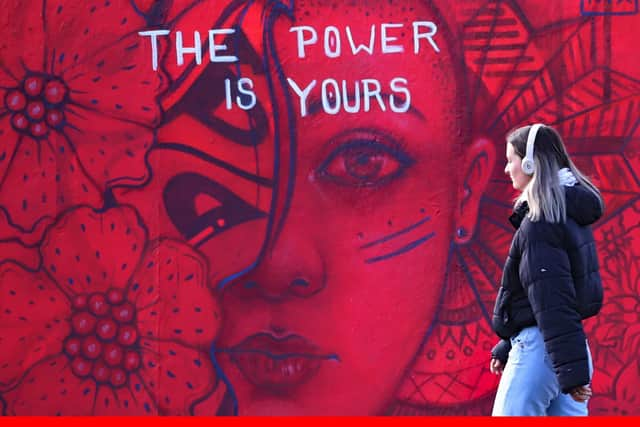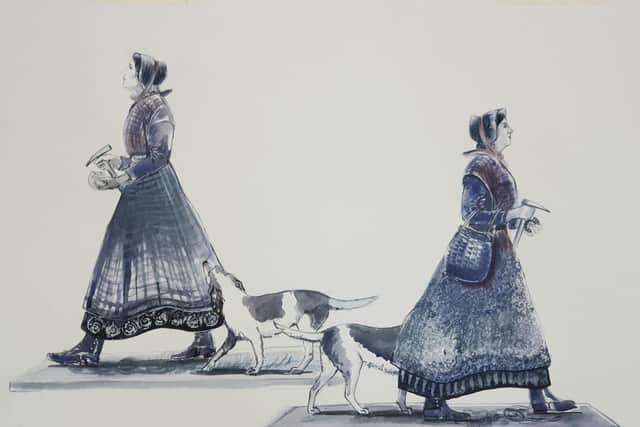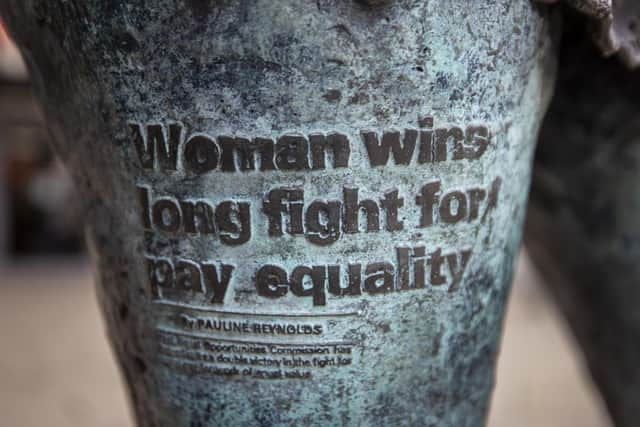Our economy and society are dependent on women, and without them the full conversation cannot take place - Rashmi Dube
Even today most of us don’t realise we are doing just that. In my article in the Yorkshire Post on 4 June 2020 entitled “The household mental burden must be shared” I wrote about the risk of women moving back to World War 2 times and the sudden return to gender stereotypes, particularly with women feeling the demands of both the domestic and work pressure, according to a Kings College London report (2020).
I was hoping to be able to say I was wrong and that during these trying times we have truly come together to ensure we all are seen and have a voice. With this in mind, as we approach a
Advertisement
Hide AdAdvertisement
Hide Adyear of the pandemic, I am asking are women and girls being seen, acknowledged, and welcomed to the discussion about the future? I not sure I can answer that in the affirmative and feel like I need to declare an emergency regarding the erosion of women’s rights.


I am sure if I do, I would find comments on my social media profiles of “overreacting” or “being dramatic”, but this is how many women and girls feel.
MP Caroline Nokes, chairperson of the Women and Equalities committee, stated recently: “Recovery from the pandemic might well be the biggest challenge facing women since the Pankhursts took up the struggle to get women to vote well over 100 years ago.”
The issue is not the pandemic. What the pandemic has done is simply magnified the problem and thrown in an avalanche that really runs the risk of pushing women back. The problem pre-existed the pandemic and is so deep that the climb women made was just a fraction of the journey they were on.
Advertisement
Hide AdAdvertisement
Hide AdThe problem is systemic in our culture, embedded in power, property, and language, all creating a thought process that has to change and sits so much in plain sight that we just don’t see it anymore. It has become such a part of the fabric of our lives that we don’t even recognise the problem.


Looking at language alone, the default for legislation and legal has been gender specific. Traditionally male pronouns and words such as Chairman are often used in company documents.
The use of language in this way is a reinforcement of historic gender specific stereotypes, something which in 2007 on International Women’s Day Jack Straw, the former Leader of the House of Commons, delivered a written statement about, announcing that the Government had asked parliament counsel to adopt gender neutral drafting.
The legal sector has still to react, not just in drafting documents but in the everyday letters in which are addressed as “Dear Sirs,” although I see some ripples of change on the horizon. Language is only one aspect that needs to change.
Advertisement
Hide AdAdvertisement
Hide AdFundamentally it is a way we think and are conditioned to react. I welcome the new generation wanting to move away from pronouns such as he and she towards gender neutral they, them and theirs. Imagine if we incorporated it into our legal system. Gender neutral language was a point that Hollywood picked up on some time ago when they reverted back to calling women “Actors”.


But it is proving hard to change our thinking. We are becoming more aware of other demographics in terms of diversity but the pandemic has once again shown the lack of cognitive diversity or illuminated the depth of our conditioning on stereotypes. This was even displayed in the Government messaging campaign ‘Stay Home. Save Lives.’ with an ad showing women and girls doing the domestic heavy lifting in the four households depicted.
The fact it was withdrawn after criticism gives cause for hope but the fact it was approved and published in the first place is a sign of how far we still have to go.
What women see in the business world in this moment is the Government Equalities Office (GEO) and the Equality and Human Rights Commission (EHRC) suspending enforcement of the gender pay gap deadlines for 2019/20, meaning there was no expectation on employers to report their data.
Advertisement
Hide AdAdvertisement
Hide AdCampaigners have placed pressure to have the report reinstated. It was never the businesses at board level, pushing back and saying, ‘actually no this is needed.’ But what the pandemic has also highlighted is the need for greater diversity and equality.
The acceleration in flexible working has proven to be a success to all genders, possibly now removing any old stigmas that may have been attached to men wanting to work from home to reduce their commute time so they can do more domestically, and wouldn’t it be great if we could see business bring about a change in their parental leave?
But where does this all leave women in real terms? It appears that women in business and the workforce are not just fighting their old fights in terms of equal pay, equal rights, and the right to sit on boards, but also the more fundamental right to be seen and heard.
Our economy and society are dependent on women, and without them the full conversation cannot take place. In order to change we need to force ourselves to view things differently and together push for change. What we need to remember is anything is possible with diversity of thought and the right strategy.